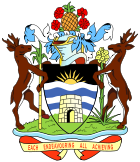This article needs additional citations for verification .(November 2024) |
 |
|---|
Organisation for National Development is a political party in Antigua and Barbuda. The party was formed in January 2003, by a group that left the United Progressive Party. Founders included Glentis Goodwin (chairman of the new party), Melford Nicholas [1] [2] and Valerie Samuel.[ citation needed ]
Following its formation, OND denounced the UPP leadership as 'corrupt and dictatorial'.[ citation needed ]